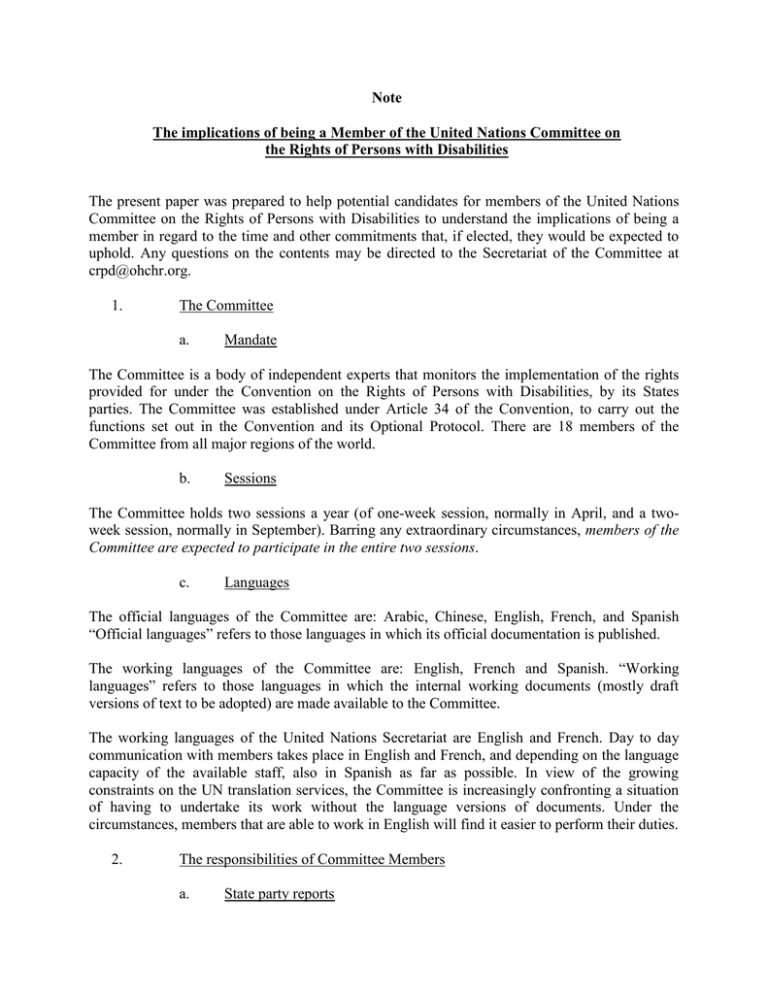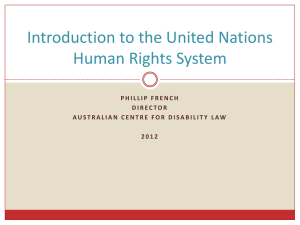Note The implications of being a Member of the United Nations... the Rights of Persons with Disabilities
advertisement

Note The implications of being a Member of the United Nations Committee on the Rights of Persons with Disabilities The present paper was prepared to help potential candidates for members of the United Nations Committee on the Rights of Persons with Disabilities to understand the implications of being a member in regard to the time and other commitments that, if elected, they would be expected to uphold. Any questions on the contents may be directed to the Secretariat of the Committee at crpd@ohchr.org. 1. The Committee a. Mandate The Committee is a body of independent experts that monitors the implementation of the rights provided for under the Convention on the Rights of Persons with Disabilities, by its States parties. The Committee was established under Article 34 of the Convention, to carry out the functions set out in the Convention and its Optional Protocol. There are 18 members of the Committee from all major regions of the world. b. Sessions The Committee holds two sessions a year (of one-week session, normally in April, and a twoweek session, normally in September). Barring any extraordinary circumstances, members of the Committee are expected to participate in the entire two sessions. c. Languages The official languages of the Committee are: Arabic, Chinese, English, French, and Spanish “Official languages” refers to those languages in which its official documentation is published. The working languages of the Committee are: English, French and Spanish. “Working languages” refers to those languages in which the internal working documents (mostly draft versions of text to be adopted) are made available to the Committee. The working languages of the United Nations Secretariat are English and French. Day to day communication with members takes place in English and French, and depending on the language capacity of the available staff, also in Spanish as far as possible. In view of the growing constraints on the UN translation services, the Committee is increasingly confronting a situation of having to undertake its work without the language versions of documents. Under the circumstances, members that are able to work in English will find it easier to perform their duties. 2. The responsibilities of Committee Members a. State party reports All States parties are obliged under the Convention to submit reports to the Committee regularly on how they implement the Convention. States parties must submit their initial reports within two year of ratifying the Convention and thereafter every four years, and whenever the Committee so requests. It is one of the main functions of the Committee to examine State party reports, whereupon the Committee issues its observations, concerns and recommendations to the State party, in the form of “Concluding Observations”. The procedure established by the Committee is based on the designation of a member for each State party report as the “Country Rapporteur” who assumes lead responsibility for the report. With the assistance of the Secretariat, he/she will analyze information on that country from all available sources and formulate a “List of issues” on that report presenting the critical issues which require further explanation from the State party than is available in the report. The List of issues, once adopted by the full Committee, is sent to the State party for written responses. The Committee will examine the report in a public “constructive dialogue” in the presence of a delegation from the State party. The Country Rapporteur leads the dialogue between the Committee and the State party. To this end, he/she must be thoroughly familiar with the country situation. While the preparation of lists of issues ensures that Country Rapporteurs become familiar with the country situation well in advance of the dialogue, it is incumbent upon them to remain abreast of developments in the countries for which they serve as Country Rapporteur in the inter-sessional period. The dialogue on each State party report culminates with the adoption by the Committee of “Concluding observations” on the State party, which are publicly issued at the end of each session. The Country Rapporteur, with the assistance of the secretariat, produces a first draft of the concluding observations, which is then considered by all members, revised as needed and adopted by the whole of the Committee. All members should make an effort to volunteer as Country Rapporteurs at least once every three sessions. b. Elaboration of “General Comments” To assist States parties to understand and implement the rights provided for in the Covenant, the Committee discharges a second major function, which is to clarify specific provisions and concepts contained the Convention through explanatory text called “General Comments”. The Committee, when deciding to elaborate a General Comment on a specific topic, normally designates a working group composed by several members to take responsibility. This often involves an extensive process of consultation with States parties, specialized NGOs and civil society organizations, individual experts, UN departments and agencies, and other treaty bodies, among many possible partners. Such consultations are often organized during formal Committee sessions, in what are referred to as “Days of General Discussion”. They generate a considerable number of expert contributions, which help the lead member to consider a wide variety of perspectives when drafting General comments, which are then presented to the Committee for reading and adopted. 2 Members who accept to participate in a working group for a General comment are responsible for developing an outline, researching the contents and writing a first draft, as well as conceptualizing the Day of general discussion on their subjects. Much of this work takes place between sessions. While the Secretariat assists at every stage, it is ultimately the draft of the focal points that is brought to the plenary for discussion and adoption. c. Activities outside the formal work programme of the Committee Members of the Committee may, depending on a variety of factors, be called upon to represent the Committee in other official events that fall outside the scope of its normal work undertaken at its regular sessions, as outlined above. Such activities may include a range of Chairpersons’ meetings (meetings held among Chairpersons of all the human rights treaty monitoring bodies to discuss issues of common concern, harmonization of working methods and various initiatives for strengthening the treaty bodies system), training or awareness-raising activities on the Convention and the Committee at the national, regional or international levels, or other speaking engagements. There is no budget allocated to the Committee for activities outside its two annual sessions. Where the Committee is invited to participate and it decides that the event is of sufficient importance to merit its support, the Office of the UN High Commissioner for Human Rights may seek funding for the travel of a Committee member; funding can however not be guaranteed and will depend on available resources. Individual members may also be approached to contribute to a variety of other activities that, although possibly related to the work of the Committee in some way, do not expressly entail official representation of the Committee. They may be invited in their personal capacity, rather than as a representative of the Committee. Such invitations would not need to be channeled to the Committee. 3. The entitlements of Committee Members a. Travel to Geneva The United Nations provides air tickets to the members of the human rights treaty bodies to Geneva for their regular sessions. In accordance with the United Nations Financial Rules and Regulations and the United Nations Travel Regulations, the travel of treaty body members are arranged on the basis of a round-trip air ticket by the class immediately below first class (normally business class) via the most economical air fare and the most direct route (one stopover is generally considered to be reasonable). If a member requests a personal itinerary that is different from the officially authorized route, he/she will be required to pay the additional costs that it entails. b. Daily Subsistence Allowance (DSA) The United Nations provides an elevated daily subsistence allowance (DSA) to treaty body members to cover the costs of accommodation, meals, local transportation, telephone costs, and other incidentals for the duration of the sessions in Geneva. DSA rates are reviewed on a monthly basis. The exact rate that members will receive for each session is communicated through the 3 letters of invitation to those sessions. Members are responsible for making their own accommodation arrangements. c. Medical insurance All experts are responsible for providing for their own medical and life insurance. The United Nations does not provide or reimburse for medical insurance. Experts are, however, covered for any “service-incurred” accidents that may arise as a function of their participation in official meetings or missions as indicated by the Secretary-General’s Bulletin on “Rules governing compensation to members of Commissions, Committees or similar bodies in the event of death, injury or illness attributable to service with the United Nations” (ST/SGB/103/Rev.1). d. Non-remuneration Membership in the treaty bodies is an unpaid, voluntary service to the United Nations. There is no remuneration or honorarium for this service. 4

